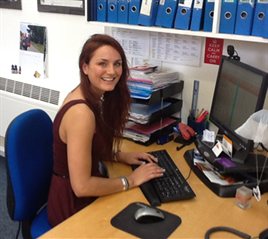Motionhouse take on interns for 3 essential reasons: they are committed to working with local education providers and communities; they increase resources during high-intensity projects (such as The Voyage); they bring a fresh approach to the company.
 Jess Rogers (Drama and Classical Literature and Civilisation) was an Administration and Marketing intern at Motionhouse from 30 May to 25 July 2012. This was a bespoke internship created in partnership with the University of Birmingham.
Jess Rogers (Drama and Classical Literature and Civilisation) was an Administration and Marketing intern at Motionhouse from 30 May to 25 July 2012. This was a bespoke internship created in partnership with the University of Birmingham.
A brief overview of Jess’s role was: scheduling activities, planning the dancers’ weekly schedules, administration of the vast database, actively supporting The Voyage (signing in and out participants, assisting in the management of the 150 community performers), research into US touring venues, producing education packs, administrating the company website, social media analysis, and even spending some time rehearsing with the professional dancers!
During the application process, applicants were asked for real life (competency based) examples of their IT skills (data inputting, formatting etc), team working experience, their strength of personality, problem solving skills, and (importantly) their knowledge of the company itself.
Some tips for applicants to arts administration internships and graduate roles:
- Get plenty of voluntary and work experience!
- Research into arts funding bodies and understand how organisations are supported and assessed.
- Create a strength of character and understand how to deal with people – be emotionally aware.
- Arts careers are often ‘portfolio careers’ - there’s no single route in and it’s a personal journey - it can take 2 years or 10 years.
Jess’s thoughts:
“I’ so glad I did it!”
“I’ve learned how to work in an office and how people interact and contribute towards a central goal. I now understand how an arts company can work so closely to their dancers. I also learned that you need to really want to work in the sector and that you have to be fully committed to the organisation and its goals.”
“I came into the internship with an open mind, but I was very surprised to meet the dancers and I didn't expect everyone to be as friendly. I was apprehensive about living on my own away from home - but haven’t felt alone at all. I’ve commuted to Leamington Spa every day from Selly Oak but this has been made worthwhile as I’ve been doing something valuable in a real company.”
“I’ve improved my emotional intelligence and self awareness thanks to working with different people from a range of backgrounds. I’ve also improved my organisational skills and now feel confident to ask questions - being inquisitive shows your dedication and interest.”
“Without the UK Professional Bursary I wouldn’t have been able to afford the travel costs, along with my rent, bills and food costs.”
“I don’t envy my friends who have been travelling for the last 2 months, I think an internship is more valuable.”